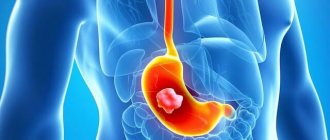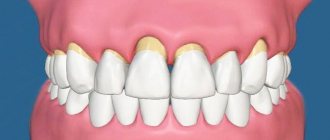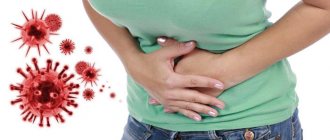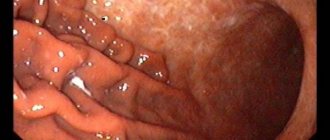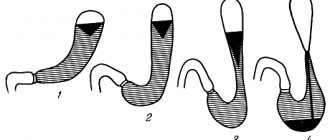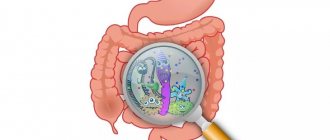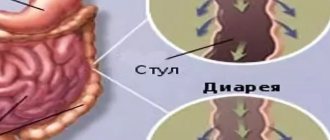Gastritis is an inflammatory process of the mucous membrane of the stomach walls due to exposure to aggressive irritants, leading to indigestion. Causes discomfort and serious consequences: erosion, ulcers, anemia, decreased immunity. When diarrhea occurs due to gastritis, the health risk is increased due to severe dehydration.
Diarrhea in different forms of the disease
The acute form of the disease develops due to stress, improper food intake or its quality, and the use of medications that cause allergies. The patient feels a sharp pain in the stomach and nausea. Diarrhea often occurs with acute gastritis. By eliminating the cause that caused the exacerbation, proper treatment and following a diet, the mucous membrane is restored and the disease recedes.
The chronic form can manifest itself for several years as separate exacerbations, with periodic bowel movements, pain and heaviness in the abdomen, and sometimes nausea and vomiting. Untreated gastritis leads to serious forms of the disease; at the first symptoms, you should consult a doctor and do not treat yourself.
Useful video
Elena Malysheva and her co-hosts figure out what diseases can cause frequent diarrhea.
Treatment of diarrhea due to gastritis should be comprehensive. Eliminating its symptoms does not mean normalizing the functioning of the gastrointestinal tract. Therefore, it is important to follow a diet and follow all recommendations of your doctor.
Gastritis is an inflammation of the stomach lining. The disease is divided into types depending on the duration, form of progression and localization of inflammation, each with its own symptoms. Let's figure out whether diarrhea is considered a symptom of the disease.
Causes of diarrhea
Diarrhea with gastritis is often caused by disruptions in nutrition, and other causes are also likely. With the disease, especially in chronic form, the functions of the stomach are significantly reduced. Due to inflammation of the mucous membrane, the process of producing gastric juice, which plays a major role in the normal digestion of food, is disrupted.
Depending on changes in secretory functions, two types of disease are distinguished: with low and high acidity. Gastritis with high acidity is often accompanied by constipation; diarrhea is characteristic of gastritis with reduced secretion.
Causes of digestive disorders with gastritis with low acidity
With a lack of gastric juice, incomplete digestion of food occurs. Food stagnates in the stomach and provokes the development of fermentation and rotting of the leftovers. A person often feels nausea, belching, and putrid breath. Incompletely digested foods irritate the intestinal walls, causing diarrhea. The patient's general health deteriorates, a feeling of weakness, apathy, and loss of appetite appear.
Digestive disorders with gastritis with high acidity
Abnormal bowel movements are also characteristic of the type of gastritis with increased secretion. Moreover, the patient often experiences constipation and severe pain, usually occurring after eating.
The cause of digestive disorders and the development of diarrhea during gastritis is dysbacteriosis and infection with the bacterium Helicobacter pylori, which, settling in the stomach and multiplying rapidly, destroys the walls of the mucous membrane.
Nutrition
During the period of acute manifestations of diarrhea due to gastritis, it is necessary to abstain from food until the condition improves and the mucous membrane is restored. Recommended drinks: green tea, Borjomi mineral water. Then the diet is gradually expanded.
- fatty, fried, spicy, salty;
- marinades;
- fast food;
- binge eating;
- alcohol, coffee, soda, grape juice;
- sour vegetables and fruits (lemon, tomato);
- Rye bread;
- foods that cause fermentation (legumes, cabbage).
- fractional meals;
- chewing food thoroughly;
- the basis of nutrition is vegetables, boiled porridge with the addition of milk (rice, oatmeal, buckwheat, millet);
- broths, pasta;
- boiled, steamed lean fish and meat (rabbit, chicken);
- vegetable puree soups (from zucchini, pumpkin, potatoes);
- vegetable purees and salads;
- peaches, bananas, green apples;
- dairy products;
- green tea;
- compotes, jelly;
- decoctions of rose hips and black currants.
Duration of disorder
Depending on the form of the disease and its duration, they speak of short-term and prolonged indigestion.
Short-term diarrhea
This form of indigestion lasts up to three days. Diarrhea is caused by spoiled food, bad water, and minor stress. Typically, recovery occurs without the use of medications while maintaining the correct diet and water balance in the body.
Prolonged diarrhea
If the illness lasts more than 5 days and is accompanied by nausea and vomiting, you should consult a doctor. Prolonged diarrhea causes dehydration. To find out the main cause of the disease, it is recommended to conduct a special diagnosis in order to prescribe adequate treatment.
Home methods
Rice water and chamomile infusion normalize digestion in a short time.
Still mineral water and saline solutions contribute to treatment and restoration of water-salt balance.
During the treatment period, bananas, apples, crackers, and rice should be added to the diet.
After the next “attack” of diarrhea, you need to replenish the fluid reserve in the body by drinking up to 300 ml of strong tea.
Regidron at home: prepare a solution of 1 liter of water and salt (1 teaspoon), soda (pinch), sugar (1 tablespoon).
Diagnostics
To establish the cause of the disease and begin proper treatment, it is important to conduct a complete diagnosis. Loose stools are considered a symptom of many disorders of the gastrointestinal tract, diseases of the liver, pancreas or gall bladder; it can be caused by an infectious infection; a comprehensive study will help determine the cause. Ultrasound of the stomach and gastroscopy are used.
In controversial and complicated cases, the doctor has the right to refer the patient for an x-ray or, during endoscopy, make a scraping and perform a biopsy. In addition to instrumental methods, studies are carried out of the results of biochemical tests of blood, urine and feces for blood content.
In what cases should you consult a doctor?
For any disorders of the gastrointestinal tract, you should contact a gastroenterologist for complex diagnostics:
- laboratory tests of blood, urine, feces;
- breath test;
- determination of acidity level;
- endoscopic and ultrasound examination;
- X-ray.
Only a doctor is able to determine the diagnosis and provide adequate treatment. Ordinary people tend to attribute stomach upsets to food poisoning - this is dangerous. Self-medication, taking inappropriate medications, folk remedies are a risk factor for exacerbation, transition of the disease to a chronic form, and the development of serious diseases, including cancer.
Diarrhea with gastritis is fraught with serious complications and requires prompt and high-quality treatment. Therapy depends on the level of stomach acidity. At the first symptoms of a gastrointestinal disorder, you should consult a doctor.
Diarrhea with gastritis occurs often. This symptom signals that the functioning of certain systems in the body is disrupted. Such alarms cannot be ignored. Patients are often too careless about their health. They believe that diarrhea and gastritis are not the most serious conditions. You should not expect that unpleasant sensations will go away on their own. There is a high probability that the general condition will only worsen. Severe and prolonged diarrhea is dangerous to health. The body loses water and strength, it becomes even weaker and more vulnerable. Against the background of such symptoms, gastritis is accompanied by other infections that aggravate the patient’s condition.
To begin competent treatment that will quickly give a positive result, you need to contact an experienced gastroenterologist. There is no point in trying to deal with the problem on your own. Taking standard anti-diarrhea medications will not help if the patient develops acute gastritis. Be sure to listen to your doctor's recommendations.
Treatment of diarrhea
If diarrhea is not treated in time, it causes frequent breakdowns and digestive disorders and leads to complications of the disease. It is especially important to quickly eliminate prolonged diarrhea, which threatens rapid dehydration and is dangerous for humans. In case of short-term stomach upset, it is necessary to quickly find out and eliminate the cause that caused the exacerbation. With elimination, the condition usually improves.
For any type of diarrhea, you must first avoid a number of foods. Mainly causing fermentation in the stomach. This includes bread and rye flour products, selected fruits, honey, milk and legumes. The use of infusions and decoctions of chamomile, boiled rice to a jelly-like state, and dried steamed blueberries will quickly help stop diarrhea. The patient is given plenty of warm fluids to prevent dehydration. The use of sorbents, activated carbon, Smecta or Enterosgel helps to recover.
If the cause of the disorder is chronic gastritis, priority treatment of the disease is required.
- If there is a bacterial infection and infection with Helicobacter pylori microbes, the doctor prescribes antibacterial treatment based on long-term use of antibiotics. It is important to complete the course of antibiotics completely; the bacteria can quickly restore populations in the stomach and lead to new exacerbations of the disease.
- The next stage will be the restoration of the secretory function of the stomach. Violation of secretion and lack of gastric juice, which facilitates the digestion of food, leads to an exacerbation of the disease and the development of diarrhea. Special antacids and acid blockers are prescribed. To help the stomach cope with digestive functions, enzymes such as pancreatin, mezim or festal are used. If the disease is accompanied by cramps and pain in the stomach, it is permissible to take antispasmodics. Medications are prescribed only by a gastroenterologist; independent use of medications leads to exacerbation and complication of the disease.
- For complete regeneration of mucosal cells, special preparations are prescribed that have enveloping properties and are capable of healing wounds and erosions.
Traditional medicine in the treatment of diarrhea
Folk remedies are actively used for indigestion. They should be used after consultation with your doctor. It is allowed to take infusions and decoctions of herbs that have anti-inflammatory and analgesic properties. For example, chamomile, St. John's wort, plantain. It is acceptable to take separately, or mix and brew a spoonful of the mixture with a glass of boiling water, let the infusion stand for several hours and take half a glass shortly before meals.
Available products cover and heal wounds well: sea buckthorn oil, flax seeds and aloe juice. Oil and flax seeds are added to salads, special decoctions are prepared from the seeds, the mucus released is filtered and drunk.
Sprouted wheat grains, in particular, are considered an excellent remedy that increases the overall immune defense of the body and digestive system.
Nutrition in the treatment of diarrhea caused by exacerbation of gastritis
For any type of diarrhea caused by various reasons, considering the phenomenon as a symptom of disease, it is important to follow a special nutritional system. You will need to follow a diet when treating gastritis. In order not to provoke the development of complications and exacerbation of the disease, remember that heavy food is not recommended - the digestive functions of the gastrointestinal tract have not yet been restored, and malfunctions of the system are likely.
A detailed nutrition plan and duration of the diet for the patient is prepared by the attending physician. They name uniform rules recommended for use during illness. You should exclude harmful foods: fried, fatty, salty, canned and spicy. Completely avoid fast food, alcohol, strong tea, coffee, and sweet sodas. Follow a special diet when food is taken after a short time in small portions. Food is taken lightly, without the use of seasonings. It is worth excluding for a short time the consumption of fruits and vegetables that increase acidity (for example, citrus fruits or tomatoes), increasing fermentation (all types of cabbage, brown bread, fresh baked goods, legumes).
The menu allows lean types of meat and fish, preferably steamed or boiled. For breakfast, it is advisable to regularly prepare well-cooked porridge with half-and-half milk. Oatmeal is suitable for the treatment and prevention of digestive disorders, maintaining the body’s immune system in good condition. Among the cereals, millet, rice or buckwheat are welcome. With normal tolerance, fermented milk products are suitable; they restore the microflora of the stomach and help a quick recovery.
Vegetable puree soups made from potatoes, pumpkin, and zucchini can stimulate intestinal motility, thanks to their enveloping properties and soft consistency, and restore the mucous walls of the stomach. Between meals you can eat fruits: bananas, green apples, peaches. Before eating, it is useful to drink a spoonful of sea buckthorn oil or herbal infusions.
Traditional methods
Decoctions of anti-inflammatory herbs are useful: St. John's wort, chamomile, plantain, as well as preparations made from them (1 spoon of raw material per cup of boiling water).
Sea buckthorn oil, flax seeds, aloe juice. They have an enveloping and healing effect on the mucous membrane. These ingredients are good both in salads and on their own.
Also helping to cope with diarrhea:
- sprouted wheat grains;
- walnuts;
- blueberries (brewed berries without sugar);
- potato starch (solution in cooled boiled water);
- hawthorn fruits (steam in the oven, consume with juice).
You can make a decoction: take 2 parts of calamus roots, and take licorice roots, yarrow herb, string, chamomile - one part each. Take 100 ml 3 times a day (for acute gastritis).
In the treasury of folk knowledge there are very effective methods that help overcome diarrhea and do not harm the stomach:
- For example, you can apply the following fee: 2 tbsp. l. blueberries, 3 tbsp. l. sage leaves, 1 tbsp. l. immortelle fruits and caraway seeds, cinquefoil roots per 1 liter. boiling water Mix the ingredients together and add liquid. It is best to use a thermos to prepare the infusion. The medicine can be used after 6 hours.
- Chamomile has long been famous for its anti-inflammatory properties. To treat diarrhea, you can prepare a medicinal decoction based on it: 1 tbsp. l. chamomile, St. John's wort, plantain per 250 ml. boiling water Mix the ingredients in an enamel bowl and leave for 2 hours. Once time has passed, strain the medicine through cheesecloth. Take it according to this scheme: ½ glass 15 minutes before meals.
- You can also take tincture of peeled walnuts. Peel one kernel and pour a glass of boiling water. Leave for about 30 minutes and drink the medicine in one dose before meals.
- Healthy and medicinal juice is obtained from potatoes, carrots and beets. To prepare it, you will need one root vegetable at a time, which you need to peel and wash. Place vegetables in a juicer and get a healing drink. Drink it 2 tbsp. l. every 3 hours. You can take the juice without harm to your health for 1.5 months.
Prevention
To prevent or minimize relapses, preventive measures must be followed. If a person treats his health carefully, follows the doctor’s recommendations, takes the necessary medications on time, adheres to a healthy diet, even with a diagnosis of chronic gastritis, he can lead a full life and suffer less from pain, discomfort and indigestion.
It is important for complete healing and non-recurrence of exacerbations in the future to follow a sleep schedule, physical activity and nutrition, give up bad habits - smoking, drinking alcoholic beverages, unbridled “gluttony”.
Diarrhea with gastritis is a common symptom, but by following preventive measures and taking the right medications, you can cope with it without serious consequences for the body.
Associated symptoms
If there are serious disorders in the body, diarrhea may be accompanied by the following symptoms:
- weakness of the body;
- sudden weight loss;
- depression, apathy;
- pain in the stomach;
- discomfort;
- bloating, flatulence;
- insomnia;
- frequent urge to defecate;
- elevated body temperature (low-grade fever – up to 38 degrees);
- tremor in the limbs;
- nausea and vomiting;
- deteriorated condition of the skin, nail plates, hair (at an advanced stage);
- dizziness;
- prostration.
In the absence of action on the part of the patient for 3 or more days, dehydration occurs, which is manifested by the viscosity of saliva, constant thirst, and dry mouth. This is a life-threatening condition that requires immediate therapeutic measures.
With pathological abnormalities in the gastrointestinal tract, diarrhea is observed 4 or more times a day. The structure of the stool may be watery or slightly dense, but the main indicator of diarrhea is the frequency of stool. Quite often, diarrhea gives way to constipation and vice versa, that is, alternation occurs, which is also considered a deviation.
How to avoid diarrhea
Diarrhea is one of the most unpleasant symptoms of gastritis. It develops against a background of severe pain and can manifest itself in both acute and chronic forms of the disease. The patient has the power to avoid serious manifestations of this condition by following the recommendations of the attending physician. The patient’s actions are varied:
- In the acute period, when all the symptoms are especially active, arrange a few days of fasting;
- Do not give up drinking, but give preference to warm, clean water; tea, coffee, juices, and other drinks are strictly prohibited; you can drink dried fruit compote without added sugar;
- When you start introducing dietary products into your diet, avoid ingredients that enhance fermentation processes in the stomach and intestines;
- During this period, give preference to porridges cooked in water until very soft.
When the body reacts sharply to the manifestations of an illness, your task is to help it cope with the problem. Do not overload the gastrointestinal tract. It is important to follow a diet and drink a lot, otherwise additional symptoms of acetonemia will develop.
Danger of condition
The main danger of diarrhea with gastritis is subsequent dehydration. The patient spends a lot of effort on removing incompletely digested food, extracting all fluid reserves so that this process goes smoother. Due to severe dehydration, problems begin at the cellular level. Humans are 80% water. It is a carrier and transmitter of all useful substances, microelements, amino acids, and vitamins. If there is not enough fluid, this can lead to serious problems, even death. It is not the diarrhea itself that is scary, but its consequences.
Lactobacilli, bifidobacteria, which multiply and live in the body, increase the immune response and respond to the normal functioning of the excretory system.
If there are not enough such bacteria, they are replaced by pathogenic microflora, and related problems appear.
For this reason, after symptom relief, probiotics are prescribed to restore intestinal microflora.
The danger of self-medication
The main problem for modern doctors is that their patients often resort to self-medication. If a person has a stomach ache, nausea and severe diarrhea, he concludes that he has been poisoned and begins to take sorbents in large quantities and antibiotics. During the acute period of development of the disease, this is not necessary. With gastritis, toxins also accumulate in the body, they need to be gradually eliminated, but aggressive sorbents negatively affect the mucous membranes of the stomach, increasing other manifestations of the disease.
Herbal decoctions for acute gastritis are contraindicated. They contain numerous active substances that have an aggressive effect on the stomach. After taking such self-medication, the patient’s condition only worsens.
Trying to flush the stomach and intestines with enemas or drinking large volumes of liquid is also not worth it. This way you will only hasten the transition of the disease to an atrophic form and the development of an ulcer.
Preventive measures
It is in your power and interests to do everything possible so that gastritis with diarrhea never bothers you at all. The main preventive measure is a radical change in diet, giving up numerous harmful foods. Experience shows that 80% of patients develop gastritis for this reason. If you eat properly and rationally, you will reduce the likelihood of developing the disease to a minimum.
Constant consumption of clean water in sufficient quantities also helps prevent the development of gastritis. Water should not be drunk cold; it should always be slightly heated.
If you follow simple recommendations, diarrhea due to gastritis will never bother you, and the disease itself will go away without additional complications.
